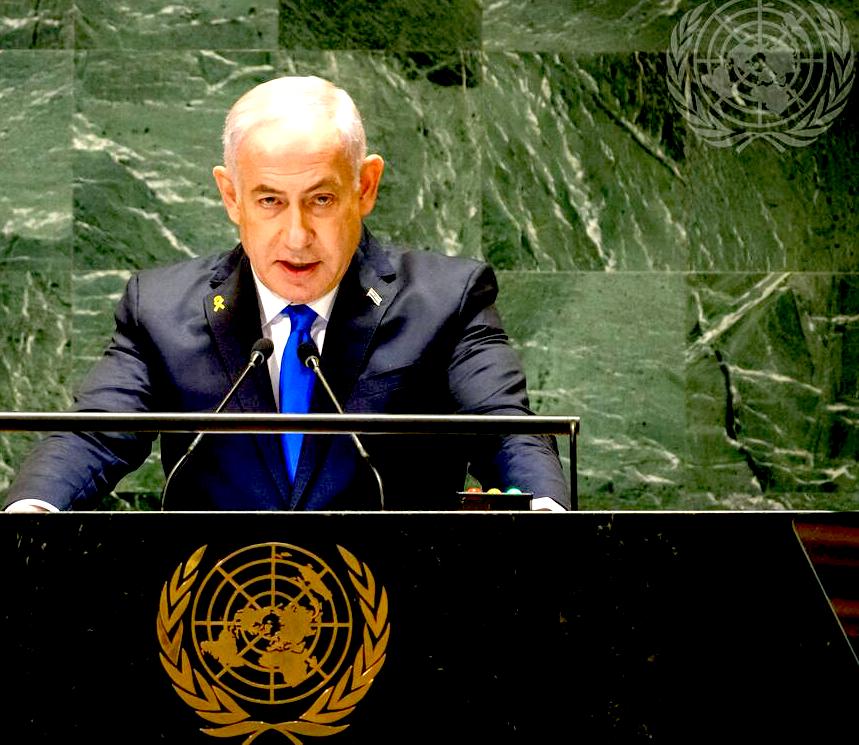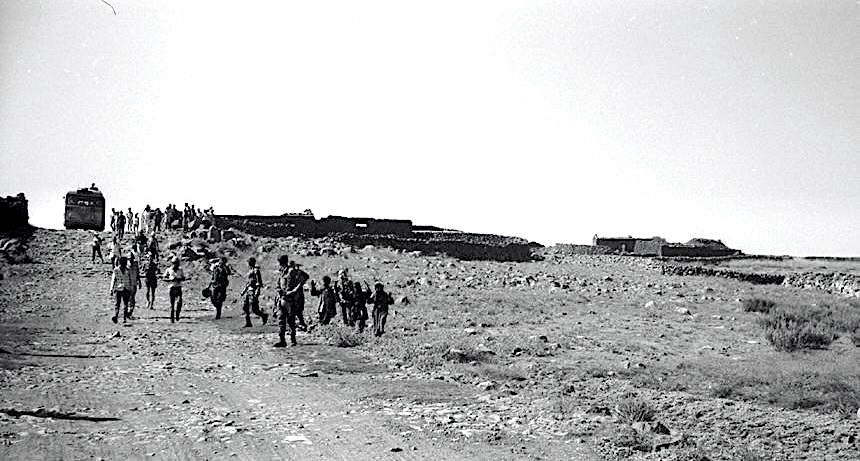
Consortium News
Volume 29, Number 354— Sunday, December 15, 2024
US & Israel Destroyed Syria & Called it Peace
Netanyahu’s ambition to transform the region through war, which dates back almost three decades, is playing out in front of our eyes, writes Jeffrey Sachs.

Poster of Syria’s President Bashar al-Assad at a checkpoint on the outskirts of Damascus, Jan. 14 2012. (VOA News, Wikimedia Commons, Public domain)
By Jeffrey D. Sachs
Common Dreams

In the famous lines of Tacitus, Roman historian, “To ravage, to slaughter, to usurp under false titles, they call empire; and where they make a desert, they call it peace.”
In our age, it is Israel and the U.S. that make a desert and call it peace.
The story is simple. In stark violation of international law, Israeli Prime Minister Benjamin Netanyahu and his ministers claim the right to rule over 7 million Palestinian Arabs.
When Israel’s occupation of Palestinian lands leads to militant resistance, Israel labels the resistance “terrorism” and calls on the U.S. to overthrow the Middle East governments that back the “terrorists.”
The U.S., under the sway of the Israel Lobby, goes to war on Israel’s behalf.
The fall of Syria this week is the culmination of the Israel-U.S. campaign against Syria that goes back to 1996 with Netanyahu’s arrival in office as prime minister. The Israel-U.S. war on Syria escalated in 2011 and 2012, when former U.S. President Barack Obama covertly tasked the C.I.A. with the overthrow of the Syrian Government in Operation Timber Sycamore.
That effort finally came to “fruition” this week, after more than 300,000 deaths in the Syrian war since 2011.
Syria’s fall came swiftly because of more than a decade of crushing economic sanctions, the burdens of war, the U.S. seizure of Syria’s oil, Russia’s priorities regarding the conflict in Ukraine, and most immediately, Israel’s attacks on Hezbollah, which was the key military backstop to the Syrian government.
No doubt Assad often misplayed his own hand and faced severe internal discontent, but his regime was targeted for collapse for decades by the U.S. and Israel.
Before the U.S.-Israel campaign to overthrow Assad began in earnest in 2011, Syria was a functioning, growing middle-income country. In January 2009, the IMF Executive Board had this to say:
“Executive Directors welcomed Syria’s strong macroeconomic performance in recent years, as manifested in the rapid non-oil GDP growth, comfortable level of foreign reserves, and low and declining government debt. This performance reflected both robust regional demand and the authorities’ reform efforts to shift toward a more market- based economy.”
Since 2011, the Israel-U.S. perpetual war on Syria, including bombing, jihadists, economic sanctions, U.S. seizure of Syria’s oil fields, and more, has sunk the Syrian people into misery.
In our age, it is Israel and the U.S. that make a desert and call it peace.
The story is simple. In stark violation of international law, Israeli Prime Minister Benjamin Netanyahu and his ministers claim the right to rule over 7 million Palestinian Arabs.
When Israel’s occupation of Palestinian lands leads to militant resistance, Israel labels the resistance “terrorism” and calls on the U.S. to overthrow the Middle East governments that back the “terrorists.”
The U.S., under the sway of the Israel Lobby, goes to war on Israel’s behalf.
The fall of Syria this week is the culmination of the Israel-U.S. campaign against Syria that goes back to 1996 with Netanyahu’s arrival in office as prime minister. The Israel-U.S. war on Syria escalated in 2011 and 2012, when former U.S. President Barack Obama covertly tasked the C.I.A. with the overthrow of the Syrian Government in Operation Timber Sycamore.
That effort finally came to “fruition” this week, after more than 300,000 deaths in the Syrian war since 2011.
Syria’s fall came swiftly because of more than a decade of crushing economic sanctions, the burdens of war, the U.S. seizure of Syria’s oil, Russia’s priorities regarding the conflict in Ukraine, and most immediately, Israel’s attacks on Hezbollah, which was the key military backstop to the Syrian government.
No doubt Assad often misplayed his own hand and faced severe internal discontent, but his regime was targeted for collapse for decades by the U.S. and Israel.
Before the U.S.-Israel campaign to overthrow Assad began in earnest in 2011, Syria was a functioning, growing middle-income country. In January 2009, the IMF Executive Board had this to say:
“Executive Directors welcomed Syria’s strong macroeconomic performance in recent years, as manifested in the rapid non-oil GDP growth, comfortable level of foreign reserves, and low and declining government debt. This performance reflected both robust regional demand and the authorities’ reform efforts to shift toward a more market- based economy.”
Since 2011, the Israel-U.S. perpetual war on Syria, including bombing, jihadists, economic sanctions, U.S. seizure of Syria’s oil fields, and more, has sunk the Syrian people into misery.

U.S. Marines and Jordanian Army soldiers collaborate in Amman, Jordan, during the Timber Sycamore operation against the Assad government in Syria, September 2016. (U.S. Military, Wikimedia Commons, Public domain)
In the immediate two days following the collapse of the government, Israel conducted about 480 strikes across Syria, and completely destroyed the Syrian fleet in Latakia.
Pursuing his expansionist agenda, Prime Minister Netanyahu illegally claimed control over the demilitarized buffer zone in the Golan Heights and declared that the Golan Heights will be a part of the State of Israel “for eternity.”
Netanyahu’s ambition to transform the region through war, which dates back almost three decades, is playing out in front of our eyes. In a press conference on Dec. 9, the Israeli prime minister boasted of an “absolute victory,” justifying the on-going genocide in Gaza and escalating violence throughout the region:
“I ask you, just think, if we had acceded to those who told us time and again: ‘The war must be stopped’– we would not have entered Rafah, we would not have seized the Philadelphia Corridor, we would not have eliminated Sinwar, we would not have surprised our enemies in Lebanon and the entire world in a daring operation-stratagem, we would not have eliminated Nasrallah, we would not have destroyed Hezbollah’s underground network, and we would not have exposed Iran’s weakness. The operations that we have carried out since the beginning of the war are dismantling the axis brick by brick.”

Netanyahu addressing the U.N. General Assembly in September. (UN Photo/Loey Felipe)
The long history of Israel’s campaign to overthrow the Syrian government is not widely understood, yet the documentary record is clear.
Israel’s war on Syria began with U.S. and Israeli neoconservatives in 1996, who fashioned a “Clean Break” strategy for the Middle East for Netanyahu as he came to office.
The core of the “clean break” strategy called for the Israel (and the U.S.) to reject “land for peace,” the idea that Israel would withdraw from the occupied Palestinian lands in return for peace.
Instead, Israel would retain the occupied Palestinian lands, rule over the Palestinian people in an apartheid state, step-by-step ethnically cleanse the state, and enforce so-called “peace for peace” by overthrowing neighboring governments that resisted Israel’s land claims.

Israeli soldiers force Syrian civilians to leave their homes in the Golan Heights, 1967. (Al-Marsad – Arab Human Rights Center in Golan-Heights, Wikimedia Commons, Public domain)
The Clean Break strategy asserts, “Our claim to the land — to which we have clung for hope for 2000 years — is legitimate and noble,” and goes on to state,
“Syria challenges Israel on Lebanese soil. An effective approach, and one with which American can sympathize, would be if Israel seized the strategic initiative along its northern borders by engaging Hizballah, Syria, and Iran, as the principal agents of aggression in Lebanon…”
In his 1996 book Fighting Terrorism, Netanyahu set out the new strategy. Israel would not fight the terrorists; it would fight the states that support the terrorists. More accurately, it would get the U.S. to do Israel’s fighting for it. As he elaborated in 2001:
“The first and most crucial thing to understand is this: There is no international terrorism without the support of sovereign states.… Take away all this state support, and the entire scaffolding of international terrorism will collapse into dust.”
Netanyahu’s strategy was integrated into U.S. foreign policy. Taking out Syria was always a key part of the plan. This was confirmed by General Wesley Clark after 9/11.
He was told, during a visit at the Pentagon, that “we’re going to attack and destroy the governments in seven countries in five years — we’re going to start with Iraq, and then we’re going to move to Syria, Lebanon, Libya, Somalia, Sudan and Iran.”
Former General of the US Army Wesley Clark on the military strategy after 9/11 attacks: "We are going to take out 7 countries in 5 years: Iraq, Syria, Lebanon, Libya, Somalia, Sudan and finishing it off with Iran" [2007]
Iraq would be first, then Syria, and the rest. (Netanyahu’s campaign for the Iraq War is spelled out in detail in Dennis Fritz’s new book, Deadly Betrayal. The role of the Israel Lobby is spelled out in Ilan Pappé’s new book, Lobbying for Zionism on Both Sides of the Atlantic).
The insurgency that hit U.S. troops in Iraq set back the five-year timeline, but did not change the basic strategy.
The U.S. has by now led or sponsored wars against Iraq (invasion in 2003), Lebanon (U.S. funding and arming Israel), Libya (NATO bombing in 2011), Syria (C.I.A. operation during 2010s), Sudan (supporting rebels to break Sudan apart in 2011), and Somalia (backing Ethiopia’s invasion in 2006).
A prospective U.S. war with Iran, ardently sought by Israel, is still pending.
Strange as it might seem, the C.I.A. has repeatedly backed Islamist Jihadists to fight these wars, and jihadists have just toppled the Syrian regime. The C.I.A., after all, helped to create Al-Qaeda in the first place by training, arming, and financing the Mujahideen in Afghanistan from the late 1970s onward.

U.S. President Ronald Reagan meeting with leaders of the Afghan Mujahideen in the White House in 1983. (Michael Evans, U.S. National Archives, Wikimedia Commons, Public domain)
Yes, Osama bin Laden later turned on the U.S., but his movement was a U.S. creation all the same. Ironically, as Seymour Hersh confirms, it was Assad’s intelligence that “tipped off the U.S. to an impending Al Qaeda bombing attack on the headquarters of the U.S. Navy’s Fifth Fleet.”
Operation Timber Sycamore was a billion-dollar C.I.A. covert program launched by Obama to overthrow Bashar al-Assad. The C.I.A. funded, trained and provided intelligence to radical and extreme Islamist groups.
The C.I.A. effort also involved a “rat line” to run weapons from Libya (attacked by NATO in 2011) to the jihadists in Syria. In 2014, Seymour Hersh described the operation in his piece “The Red Line and the Rat Line”:
“A highly classified annex to the report, not made public, described a secret agreement reached in early 2012 between the Obama and Erdogan administrations. It pertained to the rat line. By the terms of the agreement, funding came from Turkey, as well as Saudi Arabia and Qatar; the C.I.A., with the support of MI6, was responsible for getting arms from Gaddafi’s arsenals into Syria.”
Soon after the launch of Timber Sycamore, in March 2013, at a joint conference by President Obama and Prime Minister Netanyahu at the White House, Obama said:
“With respect to Syria, the United States continues to work with allies and friends and the Syrian opposition to hasten the end of Assad’s rule.”
To the U.S.-Israeli Zionist mentality, a call for negotiation by an adversary is taken as a sign of weakness of the adversary. Those who call for negotiations on the other side typically end up dead —murdered by Israel or U.S. assets.
We’ve seen this play out recently in Lebanon. The Lebanese foreign minister confirmed that Hassan Nasrallah, former secretary-general of Hezbollah had agreed to a ceasefire with Israel days before his assassination.
Hezbollah’s willingness to accept a peace agreement according to the Arab-Islamic world’s wishes of a two-state solution is long-standing. Similarly, instead of negotiating to end the war in Gaza, Israel assassinated Hamas’ political chief, Ismail Haniyeh, in Tehran.
Similarly in Syria, instead of allowing for a political solution to emerge, the U.S. opposed the peace process multiple times.
In 2012, the U.N. had negotiated a peace agreement in Syria that was blocked by the Americans, who demanded that Assad must go on the first day of the peace agreement. The U.S. wanted regime change, not peace.
In September, Netanyahu addressed the General Assembly with a map of the Middle East divided between “Blessing” and “Curse,” with Lebanon, Syria, Iraq, and Iran as part of Netanyahu’s curse.
The real curse is Israel’s path of mayhem and war, which has now engulfed Lebanon and Syria, with Netayahu’s fervent hope to draw the U.S. into war with Iran as well.
The U.S. and Israel are high-fiving that they have successfully wrecked yet another adversary of Israel and defender of the Palestinian cause, with Netanyahu claiming “credit for starting the historic process.”
Most likely Syria will now succumb to continued war among the many armed protagonists, as has happened in the previous U.S.-Israeli regime-change operations.
In short, American interference, at the behest of Netanyahu’s Israel, has left the Middle East in ruins, with over a million dead and open wars raging in Libya, Sudan, Somalia, Lebanon, Syria, and Palestine, and with Iran on the brink of a nuclear arsenal, being pushed against its own inclinations to this eventuality.
All this is in the service of a profoundly unjust cause: to deny Palestinians their political rights in the service of Zionist extremism based on the 7th century BCE Book of Joshua.
Remarkably, according to that text — one relied on by Israel’s own religious zealots — the Israelites were not even the original inhabitants of the land. Rather, according the text, God instructs Joshua and his warriors to commit multiple genocides to conquer the land.
Against this backdrop, the Arab-Islamic nations and indeed almost all of the world have repeatedly united in the call for a two-state solution and peace between Israel and Palestine.
Instead of the two-state solution, Israel and the U.S. have made a desert and called it peace.
Jeffrey D. Sachs is a university professor and director of the Center for Sustainable Development at Columbia University, where he directed The Earth Institute from 2002 until 2016. He is also president of the U.N. Sustainable Development Solutions Network and a commissioner of the U.N. Broadband Commission for Development.


The usual Leftie Wanker Bullshit.
ReplyDeleteThe usual demoNcratic Yankee & Zionist state myrmidon's diarrhea!
Deletehttps://x.com/Kahlissee/status/1868426921002029255?t=LvgZYXo5enk8o26R-5p7tQ&s=19
ReplyDeleteBREAKING: MASSIVE ISRAELI AIRSTRIKES ON TARTUS IN SYRIA
Does this look like a 'Free' Syria?
https://x.com/Kahlissee/status/1868345043263901703?t=GjJbUfA15dafrzEKpKCtgQ&s=19
ReplyDelete⚡️BREAKING: Al Jazeera journalist Ahmed Bakr Al-Louh is the third journalist to be killed by Israel in less than 24 hours.